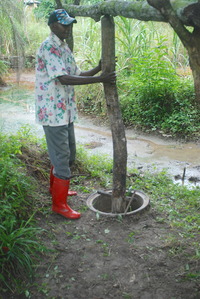The first in a three-part series of articles that will examine the global impact of oil palm agriculture on local communities.

"Most of these communities have customary systems of land management,” which often stretch back centuries, said Devlin Kuyek, a researcher with GRAIN who worked extensively on the report. “Those [systems] are under threat and they’re being ignored.”
Click here to read the article on Mongabay.
Kuyek and a global team of colleagues documented instances in which traditional economies and rights of land tenure have been swamped by a raft of land grabs, often from foreign corporations interested in industrializing oil palm agriculture.
A taste for inexpensive foods from grocery store shelves in the West has led companies to seek out the cheapest fat available. In recent decades, that’s meant palm oil. In addition, increased demand for processed food and cheap cooking oil in countries like India and China has notched up the land rush, particularly in places like Indonesia and Malaysia. Kuyek said the conversion of land in those countries to industrial oil palm plantations has at times occurred by “what is really a militarized occupation,” using deceptive tactics and coercion to force local communities from their lands to the benefit of very few.
Part of what has driven the escalation in corporate investment in oil palm plantations has been a fundamental change in the way palm oil is viewed, according to Kuyek. “Palm oil is treated as this global commodity,” he said. But in Africa – where the oil palm originated – “It isn’t a commodity crop. It’s much more than that.”